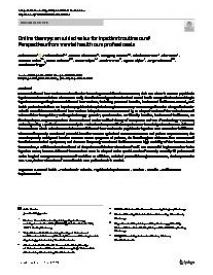Online therapy : an added value for inpatient routine care? Perspectives from mental health care professionals
Internet-delivered interventions can be effective in treating mental disorders. However, their rate of use in German psychiatric inpatient routine care is low. The current study aimed to investigate the attitude of mental health care professionals working in inpatient care regarding internet-delivered interventions, including presumed benefits, barriers and facilitators. In total, 176 health professionals from ten inpatient psychiatric hospitals throughout Germany were surveyed on site.
The professionals’ attitude towards internet-delivered interventions in inpatient care was assessed by an adapted version of the ‘Attitude toward Telemedicine in Psychiatry and Psychotherapy’ (ATTiP) questionnaire. To identify benefits, barriers and facilitators, we developed open-response questions that were based on the ‘Unified Theory of Acceptance and Use of Technology’ (UTAUT) and analyzed by a qualitative content analysis. Professionals reported little experience or knowledge about internet-delivered interventions. Their attitude towards internet-delivered interventions in psychiatric inpatient care was rather indifferent. The most frequently mentioned potential benefits were an optimised treatment structure and patient empowerment; the most frequently anticipated barriers were too severe symptoms of patients, the feared neglect of face-to-face contacts and insufficient technical equipment; and the most frequently mentioned facilitators were high usability of the internet-based intervention, a sufficient functional level of the patient and further education of staff.
For successful implementation in the inpatient sector, internet-delivered interventions must be adapted to the special needs of severely mentally ill patients and to the hospital management systems and workflow. In addition, technical preconditions (internet access, devices) must be met. Last, further education of mental health care professionals is needed.
In: European Archives of Psychiatry and Clinical Neuroscience ; ISSN: 0940-1334 | 272 | march | 107-118
https://doi.org/10.1007/s00406-021-01251-1


